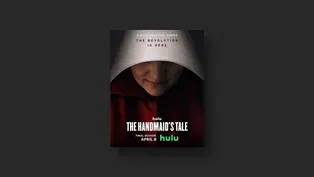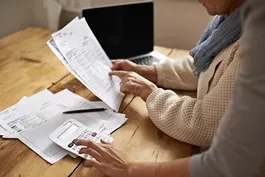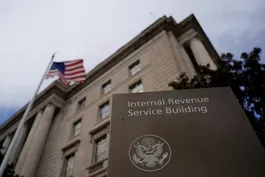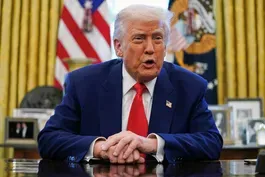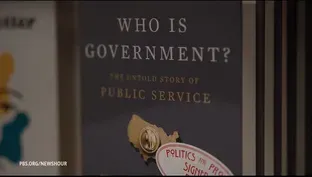
What tariffs mean for the U.S. footwear industry
Clip: 4/9/2025 | 4m 2sVideo has Closed Captions
What tariffs and trade war threats mean for the U.S. footwear industry
In the United States, the vast majority of shoes sold are imported. That means tariffs are a real issue for the footwear industry. Amna Nawaz discussed more with Matt Priest, president and CEO of the Footwear Distributors and Retailers of America trade group.
Problems with Closed Captions? Closed Captioning Feedback
Problems with Closed Captions? Closed Captioning Feedback
Major corporate funding for the PBS News Hour is provided by BDO, BNSF, Consumer Cellular, American Cruise Lines, and Raymond James. Funding for the PBS NewsHour Weekend is provided by...

What tariffs mean for the U.S. footwear industry
Clip: 4/9/2025 | 4m 2sVideo has Closed Captions
In the United States, the vast majority of shoes sold are imported. That means tariffs are a real issue for the footwear industry. Amna Nawaz discussed more with Matt Priest, president and CEO of the Footwear Distributors and Retailers of America trade group.
Problems with Closed Captions? Closed Captioning Feedback
How to Watch PBS News Hour
PBS News Hour is available to stream on pbs.org and the free PBS App, available on iPhone, Apple TV, Android TV, Android smartphones, Amazon Fire TV, Amazon Fire Tablet, Roku, Samsung Smart TV, and Vizio.
Providing Support for PBS.org
Learn Moreabout PBS online sponsorshipAMNA NAWAZ: Well, let's talk now about the kind of impact that these tariffs, threats, and changes mean for business directly.
In the United States, the vast majority of shoes sold here are imported, which means tariffs are a real issue.
I spoke just a short time ago with Matt Priest.
He's the president and CEO of the trade group Footwear Distributors and Retailers of America.
Matt, welcome to the "News Hour."
Thanks for being here.
MATT PRIEST, President and CEO, Footwear Distributors and Retailers of America: Thank you, Amna.
It's a pleasure to be here.
AMNA NAWAZ: So, things obviously are changing very quickly on this front.
As we sit here and speak now, we know President Trump has kept in place that 10 percent baseline tariff, ramped up tariffs on China, and paused them for 90 days on most other countries.
But it's worth pointing out the majority of shoes in the U.S. are imported.
When you look at where they come from, the vast majority are from China, also from Vietnam, Indonesia, Cambodia, and fewer than from India.
What does all of this back-and-forth on the tariffs mean for the businesses you represent?
And who are we talking about here?
MATT PRIEST: Yes, we represent 97 percent of the shoe industry here in the U.S., Amna.
So that is Nike, Under Armour, ASICS, Dick's Sporting Goods, Target, Walmart, and then all the way down to family importers that bring in product every single day.
And so our goal right now is to try to drive as much certainty to the business that we can, but it's a really difficult thing to do in this environment.
With each passing day, there's a tariff that's added, there's a tariff that's taken off, and so our members are scrambling to understand what the real-life impact will be on costing for consumers here in the days and weeks to come.
AMNA NAWAZ: Even with the rollback of these tariffs, does that mean the problems have gone away for these businesses?
Are they no longer worried?
MATT PRIEST: No, they're definitely still worried.
I mean, the rollback is a positive thing.
We want to commend the White House for doing that because we think there has to be some time to negotiate some of these outcomes with particularly these non - - these countries that aren't China.
But the fact of the matter is, the Chinese tariff is going 125 percent.
I had a member tell me just yesterday: "Matt, I have got to figure out how to sell a pair of shoes to a customer I sold to last year at double the price."
And in these hyperinflationary times that we're still in, that's going to be a really difficult thing to do.
AMNA NAWAZ: Double the price for -- you're expecting in terms of shoes coming from China?
MATT PRIEST: That's right.
That's right.
AMNA NAWAZ: That's what the tariffs would mean.
And with the other countries now, tell me a little bit about how this manufacturing process works.
Could it be that because the tariffs have gone up so high on China, a lot of that other supply will now shift from other countries, where the tariffs aren't in place?
How -- is that possible?
MATT PRIEST: I think the fact of the matter is, the tariffs are in place everywhere.
So, for example, a pair of sneakers coming out of Vietnam had a 20 percent duty prior to last night.
Overnight, we got to a 66 percent duty.
And now, with the president's action and the pause, we're down to a 30 percent duty.
So there's still 30 percent duty, a 33 percent increase on our costs coming out of Vietnam alone.
So there's really nowhere to go in particular.
But I think our members will continue to look for ways in which they can lever -- leverage other sourcing countries to deliver great product to American consumers.
AMNA NAWAZ: So one argument we have heard is that, if foreign imports on any products do become more expensive for American consumers, they will shift to domestic products.
MATT PRIEST: Right.
AMNA NAWAZ: Do you see that happening in your business?
MATT PRIEST: I don't.
And there's a reason for that.
We have long had duties in place for nearly 100 years.
We pay $4 billion a year before any of this action took place just on duties for imports.
Production has left decades ago or may have not even started here.
And so what we find is, what's still made here for footwear is made for U.S. military purposes or for consumers that really focus in on that.
But the fact of the matter is, we have 340 million consumers.
We bring in over two billion pairs of shoes a year.
We do not have the capacity or the willingness, to be honest with you, to make the types of shoes that are necessary to meet that demand.
AMNA NAWAZ: Is that the kind of manufacturing capacity that could be built up over time?
That's another argument we hear.
MATT PRIEST: It could be built over time, but it will not be with U.S. labor.
And the challenge is, all these tariffs, Amna, are actually being also placed on machinery, parts, components, and materials that we would import in to establish domestic production.
And so they're making it not very competitive from an economic perspective to bring that back here anyway.
AMNA NAWAZ: Matt Priest, president and CEO of the Footwear Distributors and Retailers of America, thank you so much for being here.
MATT PRIEST: Thanks for having me.
'Handmaid's Tale' stars on the evolution of their characters
Video has Closed Captions
Clip: 4/9/2025 | 6m 54s | 'The Handmaid's Tale' stars on the evolution of their characters as series reaches its end (6m 54s)
How the global trade wars could affect personal finances
Video has Closed Captions
Clip: 4/9/2025 | 4m 45s | How the global trade wars could affect personal finances of Americans (4m 45s)
News Wrap: White House freezes Cornell, Northwestern funds
Video has Closed Captions
Clip: 4/9/2025 | 4m 58s | News Wrap: White House freezes funds meant for Cornell and Northwestern (4m 58s)
Top IRS official quits over plans to share personal data
Video has Closed Captions
Clip: 4/9/2025 | 7m 11s | Top IRS official quits over plans to share personal data with immigration authorities (7m 11s)
Trump pauses many of his tariffs but raises rate on China
Video has Closed Captions
Clip: 4/9/2025 | 13m 7s | Trump pauses many of his tariffs but raises rate on China (13m 7s)
Work of public servants highlighted in 'Who is Government?'
Video has Closed Captions
Clip: 4/9/2025 | 10m 16s | Michael Lewis highlights crucial work of public servants in 'Who is Government?' (10m 16s)
Providing Support for PBS.org
Learn Moreabout PBS online sponsorshipSupport for PBS provided by:
Major corporate funding for the PBS News Hour is provided by BDO, BNSF, Consumer Cellular, American Cruise Lines, and Raymond James. Funding for the PBS NewsHour Weekend is provided by...
